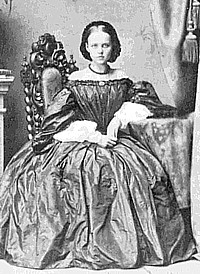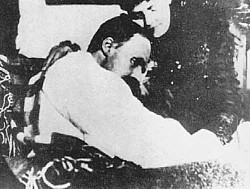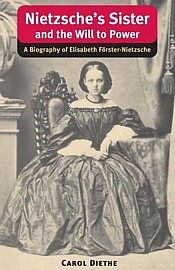Essay (back
to top)
On October 15, 1844, Franziska and Carl Ludwig Nietzsche brought Friedrich Nietzsche into the world. Two years later Friedrich’s sister, Elisabeth Forster-Nietzsche, was born on July 10 th, 1846. They were born in Rocken, Saxony and later moved to Naumburg in 1850. The family moved to Naumburg because in the previous year Carl Ludwig, who was a minister, died. Naumburg held the Nietzsche family where Carl Ludwig’s mother, Erdmuthe, was the boss of the house. According to Carol Diethe, the author of Nietzsche’s Sister and the Will To Power, the death of the father played a major role in the life journey of Friedrich and Elisabeth Nietzsche. As the name in the title states, this book is about Nietzsche’s sister and her willingness to do anything to gain power and national recognition.
To understand Elisabeth  you must look at the chronology of her lifetime. Her relationship to her brother proves what she will do for fame. They started out with a seemingly unhealthy close relationship, as if they were lovers. Following this they developed their interactions through education, and into the intellectual circles they associate with. A battle for fame began between Elisabeth and Friedrich when they expressed different viewpoints. Clearly, where Elisabeth wanted to be and where her brother stood caused friction. Consequences were witnessed as her brother seen going crazy and writings are produced that contain very little truth about her past life. Through Elisabeth fame in Nietzsche’s Sister and the Will To Power we view a picture of what 19th century Germany looked like for a fatherless daughter, and what set the stage for Hitler to rule the country and kill off many Jews. The overall view in this book Elisabeth’s willingness to abuse her family’s name as she used her brothers unfinished writings to produce The Will to Power. I came upon this subject wondering about Nietzsche and his views on the church, but I stumbled upon this book and became fascinated in the idea that Hitler had a major link to Nietzsche. you must look at the chronology of her lifetime. Her relationship to her brother proves what she will do for fame. They started out with a seemingly unhealthy close relationship, as if they were lovers. Following this they developed their interactions through education, and into the intellectual circles they associate with. A battle for fame began between Elisabeth and Friedrich when they expressed different viewpoints. Clearly, where Elisabeth wanted to be and where her brother stood caused friction. Consequences were witnessed as her brother seen going crazy and writings are produced that contain very little truth about her past life. Through Elisabeth fame in Nietzsche’s Sister and the Will To Power we view a picture of what 19th century Germany looked like for a fatherless daughter, and what set the stage for Hitler to rule the country and kill off many Jews. The overall view in this book Elisabeth’s willingness to abuse her family’s name as she used her brothers unfinished writings to produce The Will to Power. I came upon this subject wondering about Nietzsche and his views on the church, but I stumbled upon this book and became fascinated in the idea that Hitler had a major link to Nietzsche.
After 1850 the setting was a dark back room with a widow and her son and daughter in Naumburg. Living in another apartment in the house was the evil stepmother who didn’t pay much attention to her daughter-in-law, yet spoiled the grandchildren. Her relationship with her grandchildren left the widow looking like a horrible mother, or so it seemed to Elisabeth. “…Left to the care of our dear old mother, who brought us up with the same Spartan strictness and simplicity that was custom at the time, and especially in her own family (13).” This was the viewpoint that Elisabeth had of her mother, emphasizing that she wasn’t that great a mother. On the other hand Elisabeth believed her grandmother to be amazing, “As our grandmother Nietzsche was so uncommonly popular, we thought it must be happiness itself to live with her (13).” Erdmuthe, however, was a great mother who always made certain that her kids had the best. Elisabeth’s view of life focused on a different side, which could be a result of the grandmother spoiling her so much. Elisabeth’s view sets the stage similar to a Cinderella scene of what Germany looked like for a widow in the 1800’s. Another view of Germany at that time is a quote from Elisabeth about her and Friedrich playing in the garden around the house after the grandmother died and Erdmuthe was liberated. Elisabeth writes about her and her brother swinging, playing games, studying, and telling horror stories at night. She then goes on about her brother telling stories and she could just hear his voice, “…it created a wonderfully dreamlike and mysterious atmosphere (14).” This is a great childhood memory, that reminds me of being younger and how similar the childhood lifestyle was to mine as I grew up in a single mom household. The dreamlike feelings of her brother are a glimpse of her closeness to her brother. Growing up they were somewhat inseparable and throughout their education they were constantly exchanging letters. When Nietzsche became a professor and couldn’t take care of everything himself Elisabeth rushed to his aid and kept house for him as if she was his wife. Nietzsche and his sister loved each other and would do anything for one another.
Friedrich Nietzsche was able to progress through school very easily. At age fourteen he attended Schulpforta Academy where his studies in Greek and Latin led him to classical philology. At age twenty he attended Bonn University. Elisabeth didn’t have such an easy time with school. German schooling in the 19th century wasn’t geared for women. Women could only go to school until their confirmation, which at its latest would be when a girl turns 15, and even then schooling was geared toward household duties. Elisabeth attended Fraulein von Paraski’s school until she was 15. She succeded in everything she did but was taught primarily French and handwriting skills. It is interesting to see how men made certain that they were dominant. I think that it might have something to do with religion and the Bible’s teachings on wives submitting to their husbands, but it doesn’t completely make sense other than men having big egos. In any case it wasn’t until after 1871 and the creation of the Reich that women were able to graduate from high school, and then go to college. Elisabeth returned to school in 1879 to learn Italian and sharpen up her French. It’s interesting to me to find out that she never spoke out against female suppression, and she didn’t get frustrated with it, as Diethe points out. I’m surprised by it because she seemed like an intellectual who could have used a degree, since she wrote a couple of well known books in Germany during her lifetime, and she was constantly in conversation with her brilliant brother Friedrich. In thinking about it a little longer it makes perfect sense why she wouldn’t stand up for women’s rights. Elisabeth was probably a very insecure person; she was able to go with the flow of her surroundings. This makes sense in why it would be so easy for her to turn her back on her brother once she found someone bigger and better. This person didn’t appear until 1870, when Elisabeth she started spending time with Cosima Wagner and when she entered the intellectual circles and got to exchange her ideas with major reformers of the time, looking very smart.
In 1869 Friedrich Nietzsche was offered a job as professor at Basel in Philology. It is here that Nietzsche met and became good friends with Richard Wagner, a great composer in Germany at the time. Soon after becoming a professor Friedrich started to feel ill, and Elisabeth came to his aid to live with him.  She took care of the house and took care of her brother. It is with Nietzsche that she met Richard’s wife, Cosima Wagner, and they became very good friends. I think that it is through her relationship with Cosima that friction started building between Elisabeth and her brother. The Wagners were very anti-Semitic, but Nietzsche didn’t agree with them in this regard. Elisabeth would do anything to stay in with these famous people who have many connections to people in Europe. Cosima liked Elisabeth as she wrote, “Dearest Elisabeth, How are you? Have you had good news from your brother (40)?” Cosima was famous and she liked Elisabeth, while Elizabeth was infatuated with Cosima. What would Elisabeth do to stay in contact with the Wagners? In my opinion she would do anything for some fame. She would even lose her closest friend and relative, namely her brother. She took care of the house and took care of her brother. It is with Nietzsche that she met Richard’s wife, Cosima Wagner, and they became very good friends. I think that it is through her relationship with Cosima that friction started building between Elisabeth and her brother. The Wagners were very anti-Semitic, but Nietzsche didn’t agree with them in this regard. Elisabeth would do anything to stay in with these famous people who have many connections to people in Europe. Cosima liked Elisabeth as she wrote, “Dearest Elisabeth, How are you? Have you had good news from your brother (40)?” Cosima was famous and she liked Elisabeth, while Elizabeth was infatuated with Cosima. What would Elisabeth do to stay in contact with the Wagners? In my opinion she would do anything for some fame. She would even lose her closest friend and relative, namely her brother.
The Wagner’s circle was all about anti-Semitism, and Nietzsche didn’t agree with that idea. Instead Nietzsche started to fight against Christianity. Nietzsche fled the Wagner circle after Richard Wagner wrote a score that was all about hating Jews. Then Nietzsche wrote, “God is Dead,” which prompted the Christian Wagners to turn their back on Nietzsche. Elisabeth, being caught in the middle, had a choice to make at this time. At this point of the book Diethe goes on to explain how Lou Solome was the cause of Nietzsche and his sister never talking to each other. Nietzsche loved Lou and had Elisabeth try to match them up, but Elisabeth didn’t like Lou and made sure they never got together. This caused Nietzsche to never talk to his sister. I think the larger issue is that Elisabeth stood beside the Wagners in anti-Semitism and spoke out against Nietzsche and “God is Dead.” Elisabeth chose the more popular people. The Wagners were more popular than Nietzsche at the time, so Elisabeth stayed with them and kept meeting in their circles. It is interesting to note that I read on Wikipedia, which might not be a perfect source, that Hitler was a fanatic admirer of Wagner and in Hitler’s last days he was killed with some of Wagner’s musical scores in his hands. It is with the Wagner circle that Elisabeth met her short-lived husband Bernhard Forster.
Bernhard Forster was an extremist anti-Semite. He attempted to start his own racially pure colony in Paraguay, which failed. It was while he was in Paraguay that he fell in love with Elisabeth. Nietzsche completely disliked Forster, because of his radical anti-Semitic ideas. Elisabeth, knowing all about Nietzsche’s views, decided to completely turn her back on her brother and his ideas, to follow the ideas of her anti-Semitic new love. In May 1885 they got married. This was an extremely critical point because Nietzsche was Elisabeth’s everything since he was basically her father, brother, and husband growing up. To a sad note she threw it all away to be in the new movement, which helped her get a little more fame.
In June 1889 after Elisabeth had been heavily influenced by strong anti-Semitic views, Bernard died. At the same time Nietzsche was diagnosed with insanity and this rocked Elisabeth’s world. Then after her mother’s death she took over caring for Nietzsche again. Throughout his last years Nietzsche scribbled down his writings and then died on August 25, 1890. After his death Elisabeth took his writings and manipulated them in a way that fit her anti-Semitic ideas, even though Nietzsche was completely opposed to anti-Semitic ideas. She formed a book called The Will to Power, which also contained how poorly she was treated by her mother. In the end she had completely turned away from her family and defamed them, and forged everything about them. She became a fraud for power. In the end she got national recognition, and Hitler himself visited her a couple of times because of what she put in the book.
It’s interesting to see what people would do for fame. In my mind this shows that in 19th century Germany people had the same motives as people do today, that fame is priceless. I think it’s a horrible message and shows how corrupt Germany was and what it became. It is interesting how Nietzsche seems to be portrayed as the hero in this book, who stays loyal to his ideas even though he turns against Christianity. It’s also strange that Elisabeth outlived everyone, and I wonder how she coped with her conscience, especially after having Nietzsche as her brother. Elisabeth’s story makes me want to always put my family first. |


